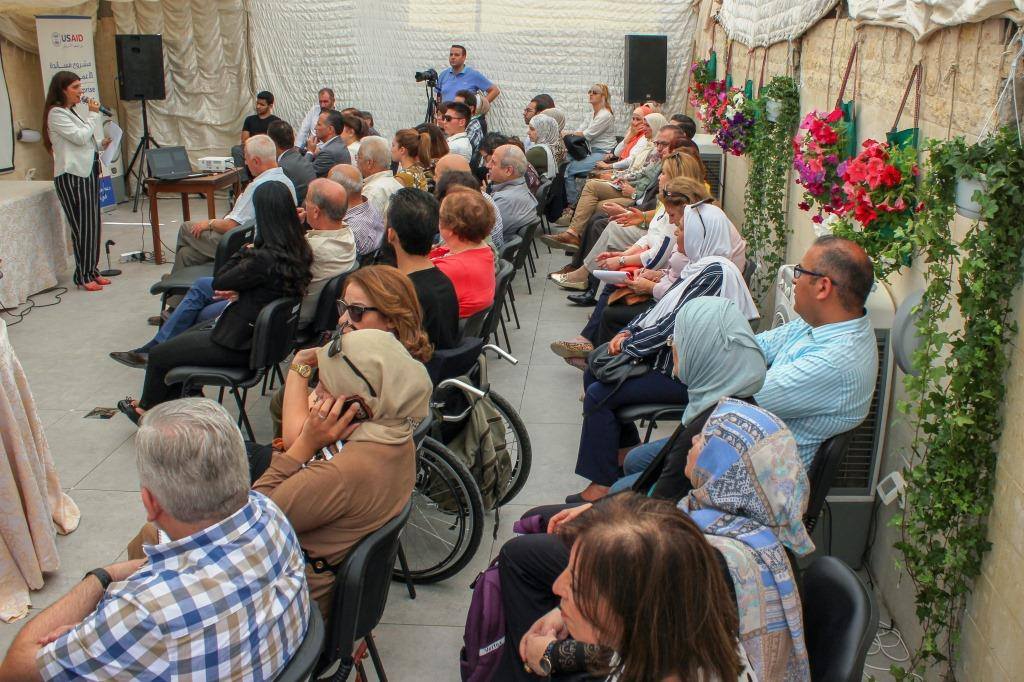Arab Renaissance for Democracy and Development (ARDD) organized a dialogue event entitled “Qa’adet Housh” (in English home-yard’s gathering) in the outer yard of Maqha Al Nahda, the Business Incubator launched recently by ARDD in cooperation with the private sector.
The session included representatives from civil society organizations, private and public sectors, journalists, activists in addition to supporting individuals and organizations. Among the participants were former government human rights coordinator Bassel Al-Tarawneh, Senators Dr. Sawsan Al-Majali and judge Taghreed Hekmat, editor-in-chief of Al-Ghad newspaper, Mr. Makram Al-Tarawneh, Jordanian artist Daoud Jalajel, and the Vice-President of Jabal Amman Resident’s Association (JARA) Mr. Khader Qawas.
The event’s theme was inspired from (Al Housh) i.e. courtyard, or the central garden of the house. According to the traditional architecture of the Levant, Al-Housh represents the social space in which all members of the extended family, whose rooms and dwellings are distributed around the Housh’s area, share their meals, discuss their daily matters, life and the problems facing them both at the family level and between the family and the community, as the basic building block of the social structure with the surrounding society and public space.
ARDD’s (Qa’adet Housh) aims to convey family gathering like atmosphere. Where members of the community, women, youth, persons with disabilities and refugees, are given the chance to communicate, interact, share their views and offer their own point of view, in order to reach recommendations and consensus that will benefit the communities, respond to their real concerns and priorities and contribute to the advancement of economic development and economic recovery.
This session, which was the first in the series “Qa’adet Housh”, aimed to discuss the results of the “Enhancing Handcrafts Skills, Marketing and Employment Opportunities”” Project which was implemented by ARDD in cooperation with the USAID-funded LENS project.
“Enhancing Handcrafts Skills, Marketing and Employment Opportunities” project launched the activities and events of “Maqha Al Nahda” which serves as an integrated business incubator. It includes a heritage & handicrafts’ training center, a showroom for handicraft and heritage products, a productive kitchen and a cultural café open to tourists and the public
The project concluded the training of more than 80 trainees including Syrian refugees and members of the local host communities in Amman and Irbid in the areas of art, mosaics, embroidery, shelling art and culinary arts.
All of this was preceded by collective training in business skills, marketing and effective communication, training on human rights and labor and employment rights, in order to provide trainees with the knowledge and skills needed to start their own individual and household projects or to strengthen and expand their existing projects.
ARDD offered the trainees a free table at JARA tourist market which is held every Friday in Jabal Amman during the summer season in order to be at their disposal and help them introduce their products to market visitors and increase their sales.
The idea of “Qa’adet Housh” is a reflection of Maqha Al Nahda, where Al Maqha in the contemporary Arab experience is not merely a place for entertainment and leisure, but an intermediate social institution through which the individual learns the values, customs and traditions of society, and better one’s personality and knowledge. It is also a literary, artistic and political salon that has always embraced the discussions of intellectuals, the inventions of writers, poets and artists, and the debates of politicians, opinion leaders and national figures.
Maqha Al Nahda represents a partnership model between the private sector and civil society. It has been chosen as a three-story stone building that reflects the original architectural character of Amman. It is located amidst an urban environment in the area between the first and second circles in Jabal Amman. Which comprises of vital public and civic institutions and the old neighborhood the home of Jordanian families and their guests including expatriates and refugees.


